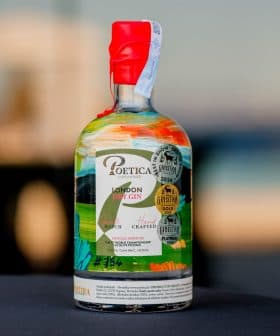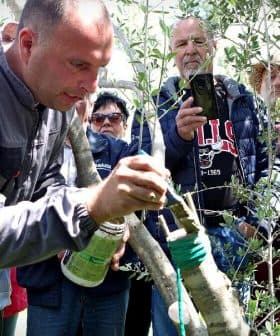Olive Oil Producer Raises €500K Through Crypto Bonds
Lamar Olive Oil, a French company, has ventured into decentralized finance by issuing blockchain-based bonds in EUROe, a cryptocurrency pegged to a stablecoin, to fund their production expansion efforts, streamlining the fundraising process and ensuring confidentiality of business data. The issuance of EUROe bonds through Obligate has proven to be faster, more reliable, and less complicated than traditional fundraising methods, with the aim of making this technology a common alternative to bank funding for SMEs and olive oil producers.
The French company behind the award-winning Tunisian Lamar Olive Oil brand has become the latest business in the sector to experiment with the blockchain.
While most blockchain-based initiatives are geared toward traceability, Lamar Olive Oil has entered the world of decentralized finance by issuing a blockchain-based bond with Obligate.
SMEs in general, but olive oil producers in particular, could benefit from decentralized finance both as a way to diversify their funding source but also to reduce their funding cost and accelerate their access to financing.
A bond is essentially a fixed-income loan made by investors to a company. Most bonds are issued in traditional currencies, such as Euros, but Lamar Olive Oil has issued bonds in EUROe, a type of cryptocurrency pegged to a traditional hard currency known as a stablecoin.
After receiving interest from new customers in France, Lamar Olive Oil sought external financing to increase production volumes and revenues. However, rising interest rates made applying for a loan from a bank less viable.
See Also:Decorated Olive Oil Bottles to Be Auctioned as Crypto Assets“We’ve raised €500,000, which we used to finance our exports with Cauvin, Emil Noël and others,” Ramzi Lahmar, chief executive of Lamar Olive Oil, told Olive Oil Times. “The return on our investment was on the order of 400 to 500 percent.”
Lahmar said fundraising through issuing EUROe had been faster and more reliable than traditional fundraising efforts.
“Before, when we went through banks, we had to send a request, tons of paperwork, physically go to the bank, make follow-up appointments, etc.,” he said. “It was infinitely long and complicated.”
“Now that I’ve issued my first bond on Obligate, everything will be even faster. If I need liquidity tomorrow, I can negotiate it today and receive the funds tomorrow,” Lahmar added. “And this is true whether I’m in Hong Kong, Canada, Tunisia, or anywhere else. Life is simpler.”
Along with less paperwork and reduced lead time between issuing the bonds and receiving the funding, Lahmar said that he trusted the confidentiality of his company’s data to the blockchain.
“In Tunisia, it happened that confidential information on my business, which I shared with banks, reached the ears of my direct competitors,” he said. “With Obligate, I am sure that my private information is safe and will not be shared.”
Traditionally, companies seeking to fundraise by issuing bonds go through a process that can take anywhere from a week to a year, depending on the amounts involved.
First, the company must approach a bank and explain what the financing will be used for before submitting financial documentation for the bank’s scrutiny. Usually, the company already needs a credit rating from a rating agency to begin the process.
After all the documentation is submitted, the bank does due diligence on the company and prepares the legal documentation before presenting the opportunity to investors in Europe’s three main financial hubs: London, Paris and Frankfurt. Once interest has been confirmed, a price is established, and the bond is placed on the market.
Benedikt Schuppli, co-founder and chief executive of Obligate, told Olive Oil Times that issuing EUROe bonds is highly automated, which makes the whole process more efficient.
Once Obligate completes its due diligence process, he said there is a two-week book-building period when the price of the bonds is established. “Everything is automated, and there is no intermediary involved, such as a bank,” he said, which lowers the costs of issuing the bonds.
After completing the book-building period, a blockchain wallet is set up, and investors pay into an escrow smart contract in exchange for the bond tokens. The EUROe is then directly sent to the company’s blockchain wallet and can be converted into Euros on a one-to-one basis in a bank account within a couple of days.
Schuppli believes that this type of fundraising will become more popular among small and medium enterprises (SMEs), such as olive oil producers.
“We certainly believe that access to bank funding has been made more difficult in recent times and that SMEs in general, but olive oil producers in particular, could benefit from decentralized finance both as a way to diversify their funding source but also to reduce their funding cost and accelerate their access to financing,” he said.
While market volatility attributed to rising interest rates caused several other stablecoins to collapse, most notably Tether and TerraUSD, Schuppli said that EUROe is unique since it is the only stablecoin backed by regulated European banks.
He added that Obligate’s ambition is to make the process of fundraising through crypto bonds as commonplace as going to a bank to apply for a loan.
“We are strong believers that this technology will emerge as the main alternative to bank funding for SMEs and olive oil producers,” Schuppli concluded.









